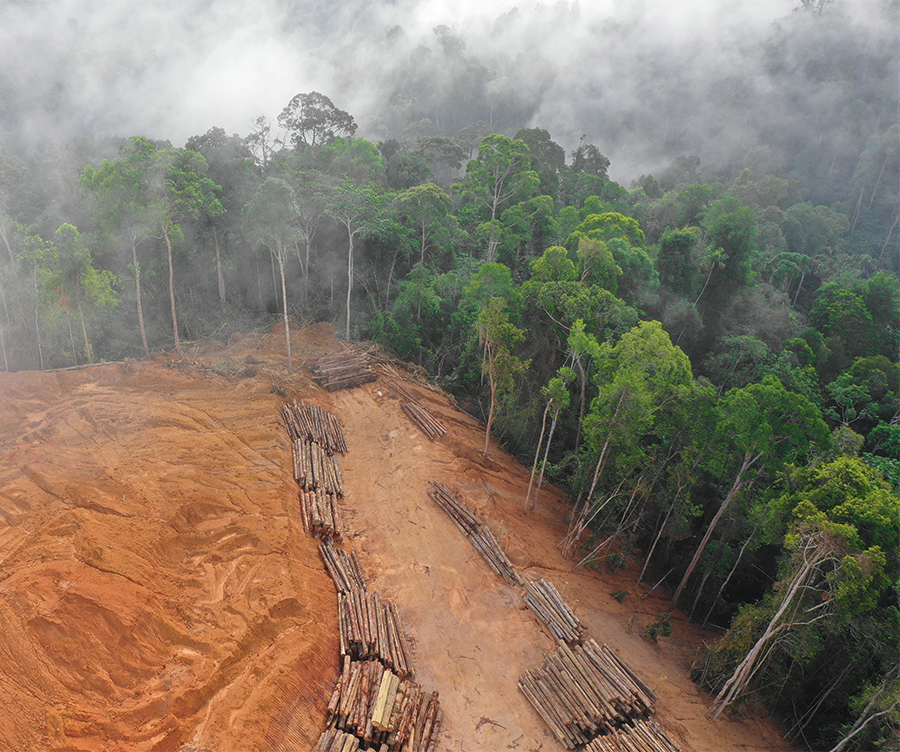A campaign group says banks are helping fuel deforestation and environmental crimes by financing major commodities producers and trading houses.
In a report published on October 21, London-based group Global Witness says between 2016 and April 2020 top-tier banks in the US, Europe and China have earned an estimated US$1.73bn from deals with 20 agribusiness firms it says are linked to deforestation.
The report combed financing arrangements for 20 companies in beef, soya, palm oil, pulp and paper, rubber and timber supply chains it identified as “the most harmful and well-established firms… based on the quality and availability of evidence about prior deforestation allegations against them”.
The firms include commodities giants such as Cargill, JBS, Olam International, Minerva, Sinochem and Noble Group. The total value of the financing captured in the report is US$157bn.
The banks and investment firms identified as major financiers of the 20 companies include JP Morgan, ABN Amro, Bank of China, Rabobank, HSBC, Blackrock, BNP Paribas and HSBC.
Most of the allegations against the companies have been previously levelled by Global Witness or other campaign groups and some date back several years.
The bulk of them concern instances where raw commodity suppliers are accused of illegally clearing forests to plant crops or farm livestock. Deforestation damages biodiversity and the livelihood of local inhabitants, while also depleting the capacity of forests to absorb rising greenhouse gas emissions.
Global Witness only assessed credit facilities, underwriting services and investments in shares and bonds provided by banks headquartered in China, the EU, the UK and the US and estimated revenues earned from financing arrangements.
“Banks are touting their green credentials with glossy voluntary policies and commitments, but our findings highlight that these amount to little more than pure greenwashing,” says the NGO’s senior global policy advisor on forests Shona Hawkes in a statement.
“Talk is cheap and money speaks louder than words – if we judge banks on their financing decisions since the Paris climate agreement, we see they are continuing to amass millions in illegitimate gains from deforestation and leaving affected communities high and dry.”
“Our new investigation reveals just how lucrative banks’ relationships are with destructive companies ripping up rainforests,” Hawkes tells GTR.
“If banks can continue to make more money from investing in dirty agribusinesses than they can from more responsible investments and face no consequences, then there is little financial incentive for them to stop funnelling money into these harmful companies.”
Overall, the NGO says banks and investment companies in the US were the biggest backers of the 20 firms assessed in the report, with US$58bn in financing identified, followed by China with US$47.3bn, the EU with US$34.7bn and UK banks providing US$16.6bn.
Soya in Brazil, palm oil in Indonesia
Among the financing relationships highlighted in the report is that between French bank BNP Paribas and privately held US commodities giant Cargill, which is estimated to have earned the bank just over US$16mn in revenue over the four-year period.
Global Witness says Cargill’s backers have ignored “multiple red flags” implicating the company in deforestation and threats to traditional landowners in Brazil, where it sources soya beans.
Cargill was fined almost US$1mn by Brazilian authorities in 2018 for allegedly sourcing soya from areas that were illegally logged. Cargill told the report’s authors that it is still contesting the fine and that it “did not purchase deforested soybeans”. The company said it is in the process of improving the traceability of its supply chains and does not source from deforested areas.
Global Witness also estimated that Dutch lender Rabobank made around US$8.8mn from its financing of Indonesian palm oil producer Indofoods, a subsidiary of the Salim Group, which Greenpeace has previously accused of destroying thousands of hectares of forest.
Global Witness says Rabobank only cut ties with the company in 2019 after it withdrew from a major industry certification scheme. The bank said in response that it has put in place policies to prevent the financing of “deforestation or land grabs” and that it engages with clients to address environmental concerns and exits relationships when progress isn’t made.
Compensation demand
BNP Paribas and Rabobank are among lenders who are reported to have withdrawn or curtailed commodities financing during 2020.
In the wake of bankruptcies and fraud cases, many financiers have shifted focus to larger and well-established commodities firms in a phenomenon labelled a “flight to quality”. However, the Global Witness findings show that while such companies may offer surer financial prospects, the environmental and social records of those firms are still subject to tough scrutiny from campaigners and governments.
ABN Amro, which is named in the report as providing the most financing to the 20 firms of any EU bank, announced last year it was largely pulling out of trade and commodities financing and said it would only service natural resources and logistics customers within Northwest Europe.
Banks are also increasingly offering sustainable financing products in the trade and commodities sectors, many of which offer cheaper rates if a company meets defined sustainability targets.
Global Witness’ Hawkes says some of those deals are “startling examples of greenwashing, with ‘green loans’ or ‘transition loans’ going to companies with deeply concerning records on deforestation and associated human rights abuses”.
“More generally, we’ve found that even key cheerleaders of green finance are in their mainstream operations financing traders and companies complicit in tens of thousands of hectares of rainforest destruction.”
The group wants governments to reduce reliance on risk reporting initiatives and instead enact or better enforce existing legislation addressing deforestation and due diligence requirements for financial institutions.
It also calls on banks to “provide remedy and redress for affected communities and ecosystems where they have caused, contributed to or are directly linked to deforestation and human rights abuses”, noting a decision last year by Australian lender ANZ to pay compensation to Cambodians evicted from their homes by a sugar company it reportedly provided a A$40mn loan to in 2011.







